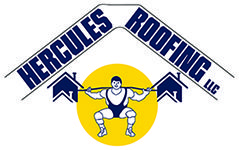Low-Slope Roofing

Roof systems and materials are divided into two general classifications: low slope and steep slope roofing.
Low slope residential roofing includes weatherproof types of roof membranes installed on slopes less than or equal to 14 degrees.
Principal Components of Most Low-slope Roof Membranes
- Weatherproofing Layer(s) - keeps water from entering the roof assembly
- Reinforcement - adds strength, puncture resistance, and stability
- Surfacing - protects weatherproofing, adds reinforcement from sunlight and weather, increases fire resistance, improves traffic and hail resistance, increases solar reflectivity
Built-up Roof (BUR) Membranes
Built-up roof membranes (BUR) or “tar and gravel” roofs, are typically made up of alternating layers of bitumen and reinforcing fabrics called roofing felt or ply sheets. Roofing felts are reinforced with either glass-fiber mats or organic mats. Sometimes, a base sheet used as the bottom-most ply is mechanically fastened. Built-up roofs are generally considered to be fully adhered if applied directly to roof decks or insulation.
Asphalt, coal tar or cold-applied adhesive are the bitumen typically used in BUR roof systems. Asphalt is a petroleum product refined from crude oil, coal tar is derived from the distillation of coal. One or the other is heated in a kettle or tanker and then applied by mop or mechanical spreader. Cold-applied adhesives typically are solvent-based asphalts and do not have to be heated in a kettle or tanker.
Surface materials used for built-up roofing systems include an aggregate (such as gravel, slag or mineral granules), glass-fiber or mineral surfaced cap sheets, hot asphalt mopped over the entire surface, aluminum coatings or elastomeric coatings.
Polymer-Modified Bitumen Sheet Membranes
Polymer-modified bitumen or modified bitumen (MB) sheet membranes are composed of reinforcing fabrics that serve as carriers for the hot polymer-modified bitumen as it is manufactured into a roll material. Similar to BUR membranes, MB roof system membranes are composed of multiple layers. MB roof systems typically are installed as a two-ply system and almost always are fully adhered.
Two Types of MB Roofing Membranes are:
- BS Polymer-Modified Bitumen Membranes - commonly installed in hot moppings of asphalt (similar to BUR systems) or cold adhesive, although some are self-adhering.
- APP Polymer-Modified Bitumen Membranes - typically heat-welded or torch-applied. Consumers should be cautioned that NRCA does not recommend torch-applying a modified bitumen membrane sheet directly to a wood deck.
Surface materials used for MB membranes include aggregate surfacing, mineral surfacing, metal foil-laminate surfacing and smooth liquid-applied surfacing.
Single-Ply Membranes
Single-ply membranes are factory-manufactured sheet membranes. They generally are categorized as either thermoplastic or thermoset. Thermoplastic materials can repeatedly be softened when heated and hardened when cooled. Thermoset materials solidify or “set” irreversibly after heating. Single ply membranes commonly are referred to by their chemical acronyms, such as ethylene propylene diene terpolymer (EPDM).
Single-ply sheet membranes are produced using one of three manufacturing processes: calendering, extruding or spread coating. The membranes may contain reinforcement layers. Common reinforcements for single ply membranes include: polyester fabrics or scrims, glass fiber, or a felt or fleece backing. Single-ply membranes can be installed fully adhered, mechanically attached or held down with ballast. Most single-ply roof systems do not receive surfacings.
In many instances, a combination of attachment methods is used to secure a roof system. For instance, insulation may be mechanically attached to the substrate with the roof membrane fully adhered to the insulation.
Thermoplastic Membranes (PVC, TPO)
Thermoplastic materials are distinguished from thermoset materials in that there is no chemical crosslinking. Heating can repeatedly soften these membranes or hardened when cooled. Because of the materials’ chemical nature, thermoplastic membranes typically are seamed by heat welding with hot air or solvent welding.
Common Subcategories of Thermoplastic Roof Membranes
- Polyvinyl Chloride (PVC)
- PVC Alloys or Compounded Thermoplastics
- Copolymer Alloy (CPA)
- Ethylene Interpolymer (EIP)
- Nitrile Alloys (NBP)
- Tripolymer Alloy (TPA)
- Thermoplastic Olefin (TPO)
- Chlorinated Polyethylene (CPE)
The Most Common Thermoplastic Roof Membranes
Polyvinyl Chloride (PVC)
PVC sheets are produced by calendaring, spread coating or extruding and are typically reinforced with polyester or glass-fiber mats or scrim. PVC sheets contain additives including plasticizers and stabilizers to impart flexibility and produce other desired physical properties. Some membranes are available with non-woven fleece backing adhered to the underside of a sheet.
Thermoplastic Olefin (TPO)
TPO membranes are produced by calendering with lamination, extrusion with lamination or extrusion-coating techniques. TPO sheets are a blend of polypropylene and ethylene propylene polymers and usually are reinforced with polyester. TPO sheets contain a colorant, flame retardants, UV absorbers and other proprietary substances to achieve desired physical properties.
Have Questions?
Whether you need a roof assessment, roof repairs or details for a roofing maintenance contract, Hercules Roofing has the answers.
